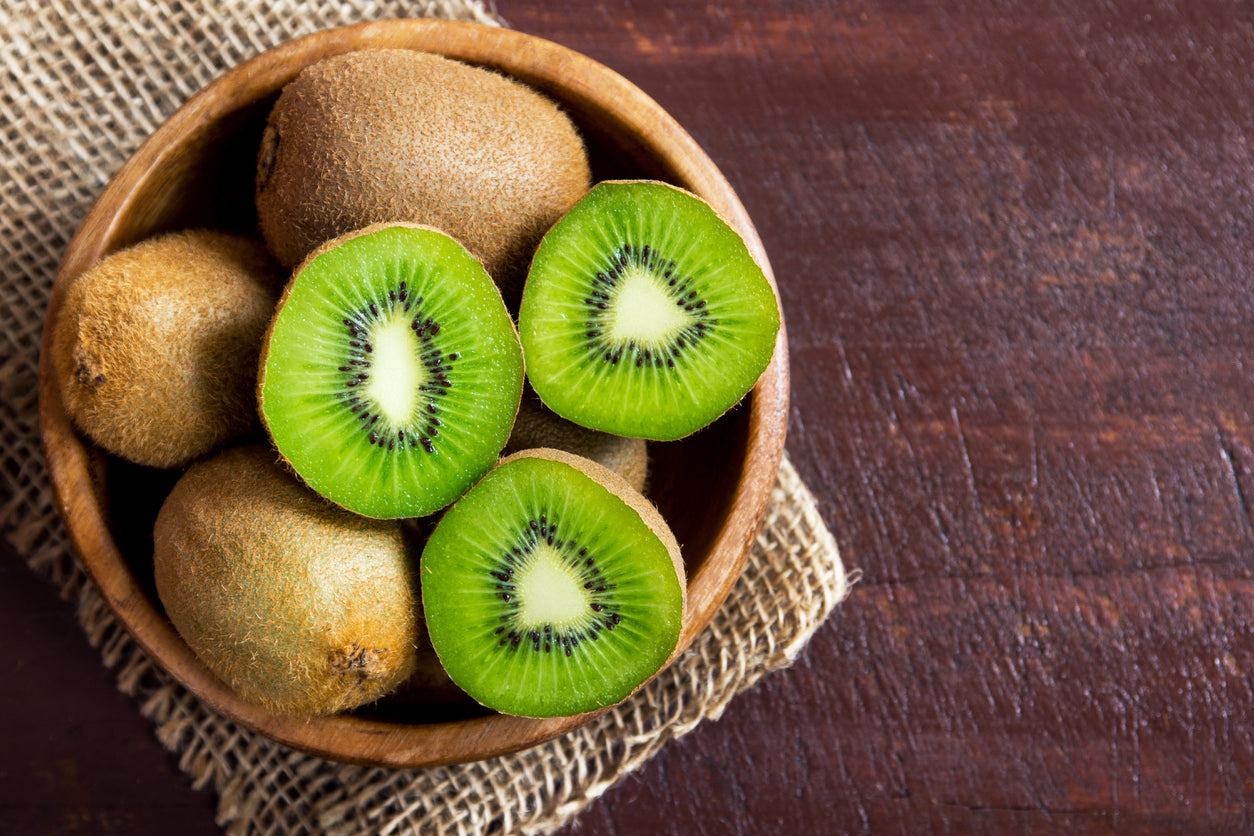Discover 4 impressive benefits of kiwi fruit

With its fuzzy brown peel, brilliant emerald green interior and a taste reminiscent of fresh blueberries and lemons, the kiwi fruit is truly a feast for the senses. Botanically known as Actinidia deliciosa (it even has a version of the word “delicious” in its name!) and also called the Chinese gooseberry, the kiwi fruit delivers numerous potential health benefits along with its tart, sweet taste.
Researchers say that this luscious fruit supports a healthy cardiovascular system, helps to protect vision and even promotes a better complexion. Let’s check out the “nuts and bolts” of kiwi fruit’s constituents, and see exactly why it can deliver so many gifts to health and wellness.
Kiwi fruit is rich in antioxidants
“Antioxidants” appears to be a real buzzword when it comes to discussing the health merits of fruits and vegetables. And, there’s a good reason for it. Antioxidants can neutralize harmful free radicals, also known as reactive oxygen species. These troublesome molecules cause oxidative stress which can trigger cell damage and disease.
Although delivering high levels of antioxidant compounds is “all in a day’s work” for virtually all fruits and vegetables, the kiwi fruit really takes it to the next level - with hesperidin, choline, caffeic acid, chlorogenic acid, quercetin, lutein and zeaxanthin, among others. And, when you factor in kiwi fruit’s relatively high content of vitamins C and E - which are powerful antioxidants in their own right - you’re getting a lot of “bang for your buck.”
Support healthy complexion with kiwi fruit
One medium-sized kiwi contains 64 mg of vitamin C, which is close to the Office of Dietary Supplements’ recommendation for an adult dietary allowance for an entire day. The vitamin C found in kiwi fruit helps to produce collagen, which is needed for healthy, supple skin. (In fact, a recent review of studies showed that collagen supplements can boost skin hydration and elasticity, potentially helping to reduce the appearance of facial wrinkles – a definite “plus” for anyone north of their teens.) Incidentally, vitamin E in kiwi fruit has been found to help protect the skin from sun damage.
All in all, kiwi fruit appears to be an outstanding choice for skin health.
Promote heart health
Kiwi fruit contains potassium, an essential mineral which helps to relax blood vessels and lower blood pressure. In addition, each kiwi fruit contains over 2 grams of dietary fiber, contributing to daily intake of this important macronutrient. Higher-fiber diets have been shown to help to lower harmful LDL cholesterol – along with risk of heart disease and colorectal cancer. Dietary fiber may also protect against overeating and binge eating, thereby reducing risk of obesity, which is in itself a risk factor for heart disease.
But, kiwi fruit’s real “secret weapon” against heart disease may be its high content of vitamin K. Researchers have discovered that vitamin K can escort calcium out of the bloodstream and into the bones, where it belongs. This not only promotes bone strength but can help act against artery-clogging plaque deposits and atherosclerosis. An influential new study from Edith Cowan University shows that people who eat a diet rich in vitamin K reduce their risk of atherosclerosis-related heart disease by over 34 percent. With a single kiwi containing a surprising 30 percent of the daily RDA for vitamin K, these succulent fruits are a wise choice for supporting cardiovascular health. (Note: If you take blood-thinning medications, check with your integrative doctor before consuming foods high in vitamin K).
Plant pigments in kiwi fruit are “sunscreen for the eyes”
Kiwi fruit contains lutein and zeaxanthin, carotenoids (natural plant pigments) that help protect against age-related macular degeneration - the thinning of the light-sensing macula in the retina - by filtering out “blue” and ultraviolet light rays. In fact, they are so successful at this task that researchers in a study published just last month in Nutrients called them “sunscreen for the eyes.” It’s not surprising that lutein and zeaxanthin are found in the AREDS (Age-Related Eye Diseases Study) supplement recommended by many ophthalmologists to preserve vision. With 84 mcg of combined lutein and zeaxanthin in each fruit, kiwis are a good source of these protective pigments).
With their gorgeous jewel-tone green color - accented by jet-black (edible) seeds - kiwi fruit make an eye-catching, tasty addition to the table. Add peeled, cut-up kiwi chunks to strawberries, pineapple, mangoes and papaya for a tropical fruit delight – or layer with yogurt and granola for a summer parfait. You can also blend them into a smoothie with apples and pears – or use them to add a sweet, surprising note to salads. Fresh kiwi fruit also shines when used in marinades, sauces and recipes for seafood, poultry or beef.
Incidentally, kiwi fruit just made the Environmental Working Group’s “Clean 15,” a list of foods considered least likely to be contaminated with pesticides.
All things considered, kiwi fruit is a stellar addition to your healthy diet. So, don’t be put off by the fuzzy, brownish peel of the kiwi – a luscious and healthy fruit awaits underneath.
Sources for this article include:
ProduceBlueBook.com





